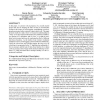Free Online Productivity Tools
i2Speak
i2Symbol
i2OCR
iTex2Img
iWeb2Print
iWeb2Shot
i2Type
iPdf2Split
iPdf2Merge
i2Bopomofo
i2Arabic
i2Style
i2Image
i2PDF
iLatex2Rtf
Sci2ools
RECSYS
2015
ACM
2015
ACM
Good Times Bad Times: A Study on Recency Effects in Collaborative Filtering for Social Tagging
In this paper, we present work-in-progress of a recently started project that aims at studying the effect of time in recommender systems in the context of social tagging, consolidating several approaches presented rather scattered in past related work. The paper presents results of a study where we focused on understanding (i) “when” to use the temporal information into traditional collaborative filtering (CF) algorithms, and (ii) “how” to weight the similarity between users and items by exploring the effect of different time-decay functions. As the results of our extensive evaluation conducted over five social tagging systems (Delicious, BibSonomy, CiteULike, MovieLens, and Last.fm) suggest, the step (when) in which time is incorporated in the CF algorithm has substantial effect on accuracy, and the type of time-decay function (how) plays a role on accuracy and coverage mostly under pre-filtering on userbased CF, while item-based shows stronger stability over the experimen...
| Added | 17 Apr 2016 |
| Updated | 17 Apr 2016 |
| Type | Journal |
| Year | 2015 |
| Where | RECSYS |
| Authors | Santiago Larrain, Christoph Trattner, Denis Parra, Eduardo Graells-Garrido, Kjetil Nørvåg |
Comments (0)

